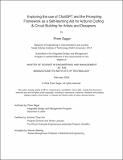Exploring the use of ChatGPT and the Prompting Framework as a Self-learning Aid for Arduino Coding & Circuit Building for Artists and Designers
Author(s)
Sagar, Prem
DownloadThesis PDF (8.567Mb)
Advisor
Hu, Antonio (Tony)
Terms of use
Metadata
Show full item recordAbstract
The intersection of art, design, and technology is a thriving place for groundbreaking ideas and crossdisciplinary innovation. However, it requires a specific long-term focus on integrating STEM subjects with the formal design education system. With the advent of AI educational tools, particularly ChatGPT, it is now possible to receive personalized learning in STEM subjects. Hence, in an effort to enhance selflearning practices of STEM topics among artists and designers, this research delves into the efficacy of integrating ChatGPT and a structured prompting framework for teaching Arduino coding and circuitry. The study is driven by three pivotal questions: the appropriateness of recommending ChatGPT in academic settings given its potential inaccuracies; the effect of a systematic prompting approach on mastering Arduino skills in a self-taught environment; and the validation of this methodology through comparative baseline and endline assessments. Adopting a mixed-methods research design, the study involved conducting a Randomized Control Trial (RCT) and gathered both qualitative and quantitative data in two phases: an initial baseline to gauge pre-existing knowledge, followed by an endline measurement to evaluate progress. Results reveal that while participants showed overall improvement in technical knowledge, those without the structured prompting framework (control group) surprisingly outperformed their counterparts. This was evident in the higher median scores achieved by the control group in endline assessments. Conclusively, while ChatGPT shows potential as an educational tool for self-learning Arduino coding and circuit building using TinkerCAD, the structured prompting framework's effectiveness remains questionable.
Date issued
2024-02Department
System Design and Management Program.Publisher
Massachusetts Institute of Technology